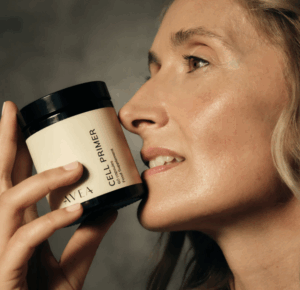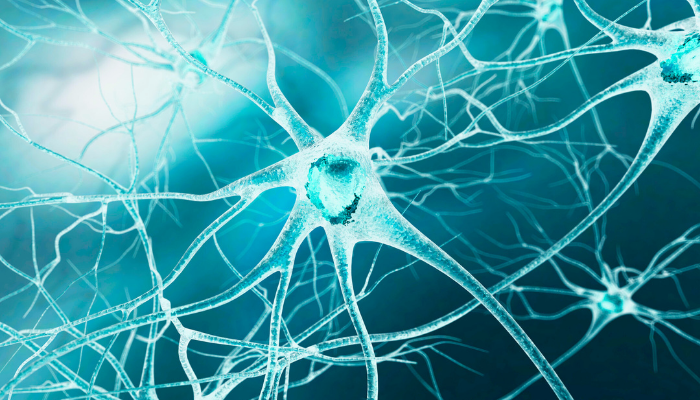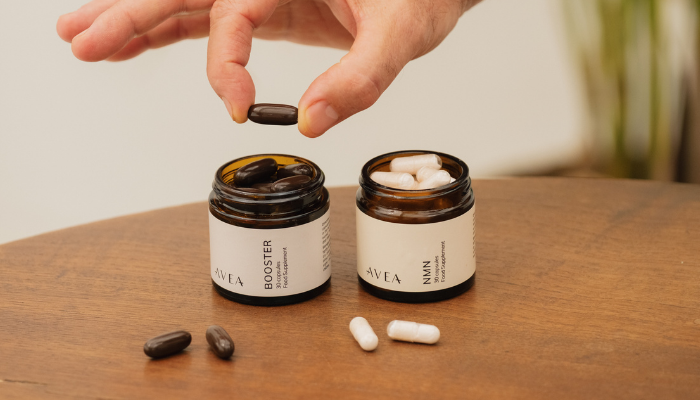At Avea, we believe that building good habits is the cornerstone of adopting and maintaining a healthy lifestyle.
To boost longevity, it is important to cultivate positive daily habits that benefit both your mind and body.
In his book Atomic Habits, James Clear provides a comprehensive guide to habit formation, outlining the four laws of behaviour change and the power of small habits.
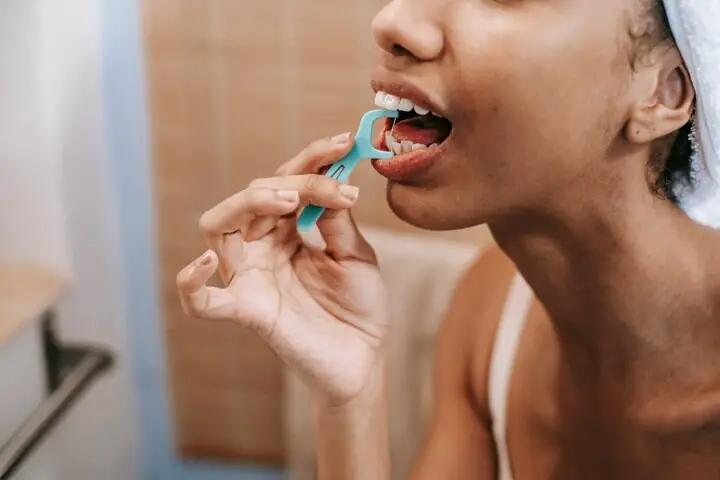
This article draws heavily on Clear’s book to provide insights into how to form good habits and break bad ones, in an attempt to achieve optimal health. There’s no magic bullet to offset a poor lifestyle.

According to scientists from Duke, habits make up around 40% of our daily behaviours.
In this article
Free guide to reverse your biological age

- Master the science of rejuvenation.
- Apply proven tips to turn back the clock.
- Transform your health with top longevity specialists.
The four laws of Behaviour Change
There are genes. Then there are habits.
Habits are part of your life that you can influence to determine the outcomes. They are routines that become second nature.
Whilst some people have natural predispositions to things that make them better, even if you are talented, you cannot succeed without having great habits to execute and fully realise your potential.
Understanding the nature of habits can help you implement good ones and get rid of the bad ones. Based on science, Clear outlines the four laws of behaviour change in habit formation as cue, craving, response and reward.
The cue
This is the piece of information that triggers your brain to initiate your next action or thought, in anticipation for a reward.
Our ancestors spent much time looking for rewards such as food, water, and sex for survival and reproduction. Today, these pursuits often appear as having a satisfying job, maintaining healthy relationships with oneself and loved ones, as well as achieving a certain amount of money, power, and fame.
The cravings
When your mind becomes aware of a nearby reward, cravings begin. These are the motivational force behind every habit. A desire for change is needed for any action to occur.
For instance, you might check your phone because you desire a distraction from a task you find unpleasant at the particular moment. You crave a beer at the end of the day because of the feeling of relief it provides.
Cravings are all intrinsically linked to the desire to change the current internal state, but they differ amongst people. Given context, a cue changes into a craving depending on the thoughts, feelings, and emotions of the person.
The response
A habit can either be a thought or an action. The response depends directly on the amount of motivation present and the physical and mental effort required to change.
The ability to act upon a cue and respond to a craving is also contingent upon your capability to execute it.
For instance, if you want to run a marathon but have a health condition that prevents you from participating in strenuous physical activity, then running a marathon may not be a feasible goal for you.
It’s important to set realistic goals that take into account your abilities and limitations.
The reward
Reward is the outcome that reinforces the habit.
Ultimately, your response delivers a reward, the end goal of every habit. You chase rewards because they serve two purposes:
- they satisfy you
- they teach you something.
As you go about your daily life, your brain is continuously monitoring which actions satisfy your desires and deliver pleasure. By closing the feedback loop and completing the habit cycle, rewards are an essential component of habit formation.
Altogether, these four laws form a neurological feedback loop to form habits that will either help you reach your goals or lead you down a path of self-destruction.
Becoming aware of your daily habits is the very first step to designing a practical framework that helps you form good habits and break the bad ones.
How to break bad habits?

Every action you take is like a vote for the type of person you will become. If you master the right actions, you master the right habits, you begin to cast votes for your new identity of the desired person you want to be.
Bad habits are often performed as a response to stress. Biting nails, head scratching, or constant fidgeting are all ways of coping with stress. Bad habits stay because they provide some sort of relief to other underlying issues, and they usually take on different forms or go unnoticed.
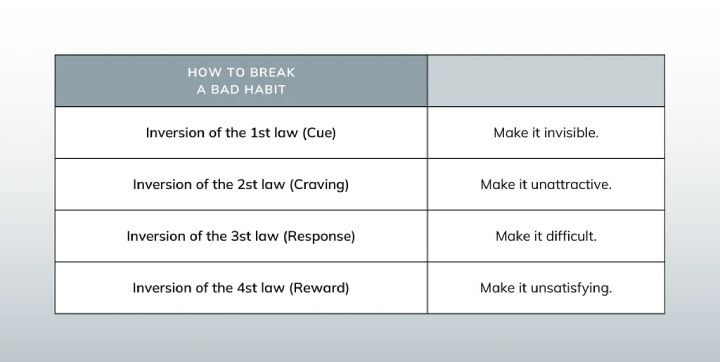
For example, taking a smoking break during work might give you a chance to socialise with coworkers, but it can also harm your productivity and increase your risk of developing lung cancer amongst other health issues. Recognising the deeper issues and beliefs behind bad habits are crucial to overcoming them.
Next, to change your behaviour for good, you need to start believing new things about yourself.
As Clear mentions in his book, you need to build identity-based habits. This means you need to start seeing the new, healthier, happier you.
For example, if you want to dance as your new hobby, imagine yourself as a dancer, not just someone learning dance steps. You decide the person you want to be, and you prove it to yourself through baby steps everyday.
Forming new habits takes time because your brain needs to create new neural pathways and break old ones, which requires consistent repetition over an extended period. Consistency and patience are crucial for creating sustainable and attainable goals.
How to form good habits?

It takes anywhere from 18 days to 254 days for people to form a new habit.
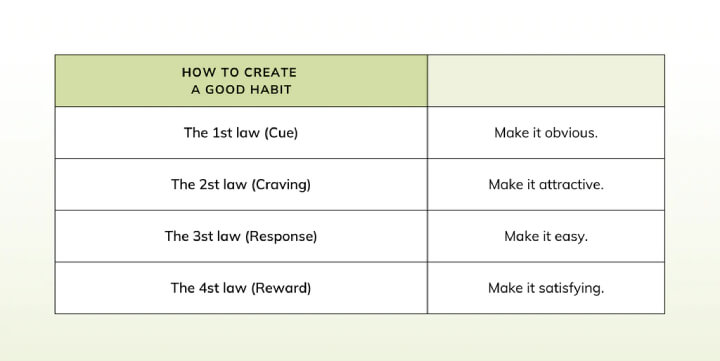
Good habits are building blocks of a healthy lifestyle and, though challenging, the benefits of cultivating them are well worth the effort. Whether you want to break bad habits or form good ones, it’s important to remember that habit formation is a process, not an event. Here are our top picks when it comes to forming good habits that stick:
1. Habit stacking
Make it easy by building new habits on top of existing ones. If you want to start drinking more water, you can stack this habit onto an existing one, like brushing your teeth. By doing so, you make it easier to build on new habits and increase your chances of succeeding.
2. Optimising your environment
Refine your surroundings. If you want to eat healthier, stock up your kitchen with healthy foods and remove obstacles and triggers like unhealthy snacks or drinks.
Being around people who share your goals and values can also make it easier to adopt new habits and stick to them.
An accountability partner or someone who checks in on your progress can further provide support and motivation to build good habits.
3. Embracing setbacks
Prepare for failure to bounce back quickly.
Let’s say you’re trying to go to the gym three times a week, but you know that you will have a busy work schedule next week. You get to come up with a back-up plan ahead and still get back on track without letting a single setback derail your progress.
Failures help build resilience and adaptability. There are also things which you can’t control. By accepting that setbacks will happen and preparing for those in your control, you can approach habit formation with a growth mindset.
4. Using positive self-talk
It takes effort, repetition and time until a new habit becomes automatic. Practice self-compassion everyday, even when you slip up.
Building a new habit is a process that requires patience and persistence. Habits do not form in one day and making mistakes is a natural part of the learning process.
Don’t forget to celebrate the small wins.
5. Envision your future self
Visualise yourself succeeding and building the new identity. Imagine yourself as the healthier, happier person, and use this vision to motivate yourself to stick to your new habits.
Instead of telling yourself you “have to” do something, remind yourself that you “get to” do it, which can help shift your mindset towards a more optimistic outlook.
6. Choose yourself first
Social norms, or what is considered typical behaviour in a given group, can also influence your habits.
If it’s common in your social group to drink heavily on weekends, you may find it challenging to cut back on alcohol if that’s your new goal.
Try suggesting other activities which do not involve drinking, and seek out a supportive social circle that shares your values and encourages healthier habits.
7. Use a Habit Tracker
If you want to stick with a habit for good, one simple and effective thing you can do is keep a habit tracker.
Elite performers often measure, quantify, and track their progress in various ways. Each little measurement provides feedback. It offers a signal of whether you are making progress or need to change course.
Key takeaway: The power of small habits
Clear argues that your outcomes in life are often a lagging measure of your habits. Your bank account is a lagging measure of your financial habits, your weight is a lagging measure of your eating habits, your knowledge is a lagging measure of your learning or reading habits.
Whilst the world fails to deliver a proper healthcare, economic, and educational system, there are certain habits within your reach that you can adopt to bring you closer to the life you want to live and achieve optimal health.
To make lasting positive changes, start small. You don’t necessarily need to transform your life overnight. Your brain is constantly analysing every piece of information it comes across. Create a feedback loop that, with time, reinforces good behaviour and helps you achieve your long-term goals. Actively work to break your bad habits.
Small daily improvements lead to remarkable results over time. So, focus on the process rather than the outcome. Build momentum towards your goals. Small wins help you develop a growth mindset and handle challenges better when they come.
Small habits are what ultimately defines you. Learn the secret habits to longevity here.


